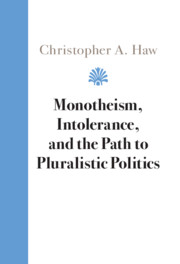Book contents
- Monotheism, Intolerance, and the Path to Pluralistic Politics
- Monotheism, Intolerance, and the Path to Pluralistic Politics
- Copyright page
- Contents
- Preface
- Abbreviations
- Introduction
- 1 Pluralism’s Requisite Intolerance
- 2 Girard’s Mimetic Theory and Monotheism’s Ambivalent Effects
- 3 Monotheism and the Monopoly on Violence
- 4 Containing Violence and Two Entirely Different Kinds of Religion
- 5 Polytheism and the Victim in Ancient Egypt
- 6 A Political Theology of the Mosaic Distinction
- 7 Jesus Christ and Intolerance
- 8 Conclusion
- Bibliography
- Index
7 - Jesus Christ and Intolerance
Toward Revelation without Rivalry
Published online by Cambridge University Press: 04 June 2021
- Monotheism, Intolerance, and the Path to Pluralistic Politics
- Monotheism, Intolerance, and the Path to Pluralistic Politics
- Copyright page
- Contents
- Preface
- Abbreviations
- Introduction
- 1 Pluralism’s Requisite Intolerance
- 2 Girard’s Mimetic Theory and Monotheism’s Ambivalent Effects
- 3 Monotheism and the Monopoly on Violence
- 4 Containing Violence and Two Entirely Different Kinds of Religion
- 5 Polytheism and the Victim in Ancient Egypt
- 6 A Political Theology of the Mosaic Distinction
- 7 Jesus Christ and Intolerance
- 8 Conclusion
- Bibliography
- Index
Summary
Chapter 7 conceptualizes how, if monotheism “separates” God from the political sphere this does not result in what Mouffe denounced as depoliticization. I examine Christ as manifesting the monotheistic “separation” from the political sphere while agonistically engaging the mechanisms of scapegoating. In Christ the victimized-divinity we do not have a regression into polytheism; nor yet do we find an “escape” from the sacrifice and exclusion that polytheism contained. Rejecting both as insufficient, I consider Girard’s paradox that Christianity is an “exit from religion in the form of a demythified religion.” Drawing cues from Mouffe’s critiques of liberalism, I see in monotheism not an escape from intolerance into an exclusion-free utopia, but something more like exclusion-in-reverse in which intolerance is a photographic negative. I thus illustrate Christ as embodying a monotheism that – precisely through, not despite, his intolerance – points us toward the marginalized other and pluralistic concerns today.
Keywords
- Type
- Chapter
- Information
- Monotheism, Intolerance, and the Path to Pluralistic Politics , pp. 191 - 245Publisher: Cambridge University PressPrint publication year: 2021

